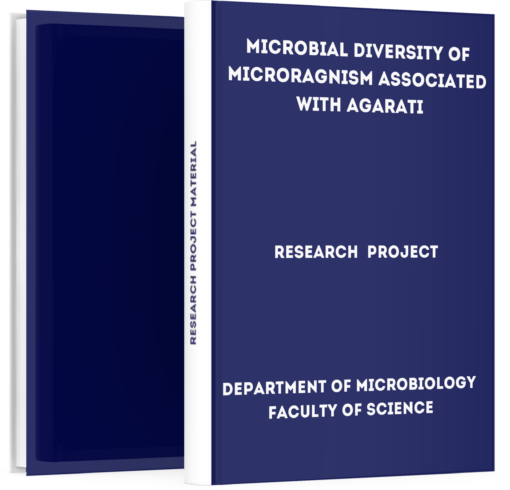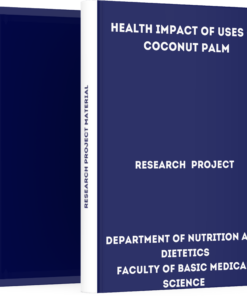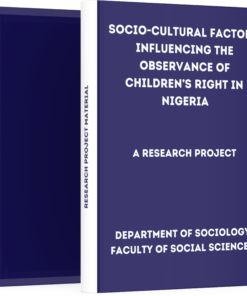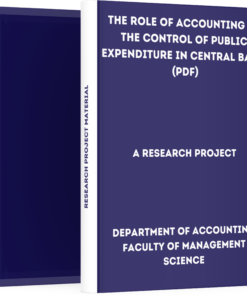Microbial Diversity Of Microoragnism Associated With Agarati
₦3,000.00
If you are interested in getting this project material “Microbial Diversity Of Microoragnism Associated With Agarati”, click on the DOWNLOAD BUTTON to make payment and the file will be delivered to your email immediately after confirmation.
Description
– Microbial Diversity Of Microoragnism Associated With Agarati –
Download Microbial Diversity Of Microoragnism Associated With Agarati. Students who are writing their projects can get this material to aid their research work.
Abstract
The analysis was carried out to determine the microbial load on African oil bean. The Total Heterophilic Bacteria Count recorded ranges from 1.2 X 1010 – 2.8 X 1010 Cfu/g and the Total Coliform count ranges from 7.8 X 109 – 9.8 X 109Cfu/g and the Total Fungi Count obtained ranges from 1.6 X 1010 – 1.7 X 1010 Cfu/g.
Five genera of bacteria were isolated which are salmonella, Staphylococcus, Escherichia coli, Bacillus, and Klebisiella. Fungal isolates were Rhizopus spp., Aspergillus spp., mucor spp., and Penicillium spp.
The presence of microorganism in food can be during food processing and handling. The high coliform counts are an indication of poor sanitary practices in production of these samples.
Introduction
1.1 Background of the Study
Agbarati also known as “Usu” is an indigenous meat analogue produced mainly in the rural areas of South Eastern Nigeria. It is generally understood as melon cake. Melon cakes are sometimes mixed with cooked sliced fermented oil bean fruit called “Ugba” in Ibo and cooked with stockfish (Nwokoma, 2008).
This local delicacy is a steamed product obtained after blending uniformly melon seeds (Colocynthis citrullus) and “Erousu” (Sclerotus tuber-regium) with the addition of other ingredients (Pepper, Onions, Salt, Warm water and Seasoning).
It is eaten as asnack and is often added to vegetable soups as a meat substitute. In some rural parts of Nigeria, melon seed meal is compacted into patties that serve as a meat substitute (Ogunsua, 2000).
In Imo State, it is called “Agbarati”, in Umuahia “Ngbam”, in Onitsha, “Agbaghelu atui” and understood in the Ibo tribe as “Akpuruakpu Egusi”. Melon seeds are pounded and used in the preparation of popular steamed snack known as “Agbaghelu atui” (Onitsha) (Nwokoma, 2008).
They are molded into balls of various shapes (round, flattened or cylindrical) with the colour of its balls ranging from dark brown to light grey. Health wise, the meat analogue is important to the diet because they provide the body with proteins, fiber and other essential micronutrients (Decker, 2004).
David and Aderibigbe (2010) stated that its composition shows: Moisture content of 40%, Ash content of 14%, Crude fiber of 2.40%, 20% fat, 10.50% protein and Carbohydrate of 10.60 %. It has a shelf life of 24hours at ambient temperature (Akobundu et al., 1982; Nwakaudu, 2010).
How to Download this Project Material
First, note that we are one of the best and most reliable online platforms because we don’t retain any of your personal information or data as regards making payments online.
PRICE: ₦3,500 ₦3,000 (Three Thousand Naira Only)
Make a bank deposit or mobile transfer of ₦2,000 only to the account given below;
Bank Name: UBA Account Number: 1022564031 Account Name: TMLT PRO SERVICES
After making the payment, CLICK HERE to send the following on WhatsApp;
- Depositor’s Name or Screenshot of Payment
- Name of the Past Question
- Active Email Address
or Call Us On +2348082284439 Once your details have been received and your payment confirmed by us, you will receive the past question in your email or WhatsApp within 5 Minutes.
Guarantee of Getting the Material
We understand that due to the high rate of fraud, many people are afraid of making purchases online but be rest assured that PastExamQuestions will deliver your material after payment.
Once your details have been received and your payment confirmed by us, you will receive the past question in your email or WhatsApp.
Give us Feedback
Have we been able to satisfy you? How well do you think the material will be helpful after having gone through it? Does the price worth the material?
Let’s hear from you! We recommend that our customers give feedback at the end of every transaction to enable us to serve better. You can do this by clicking the review button on this page.
Where is the review button? >> Just scroll up to where you see reviews





Reviews
There are no reviews yet.